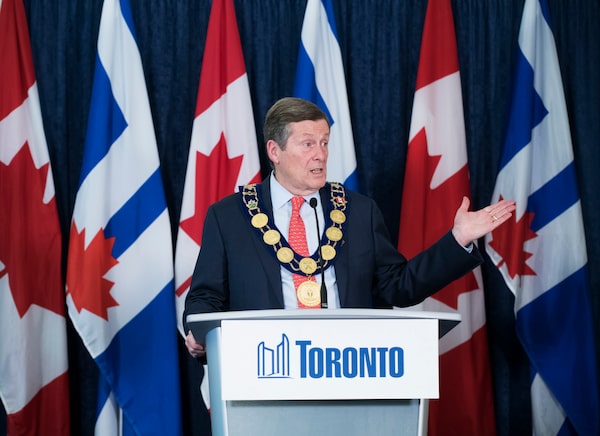
Toronto mayor John Tory takes questions during a press conference following the first meeting of the new and reduced Toronto city council, on Dec. 4.Fred Lum/The Globe and Mail
A statue of Winston Churchill stands outside Toronto City Hall. From his perch on a concrete plinth, the glowering figure looks out at the city, his hands on his waist, his chin jutting forward defiantly.
As a plaque explains, Churchill was not just an inspirational wartime leader – the man who gave the British lion its roar and saved the world from tyranny – but a lifelong champion of parliamentary democracy. Through the depths of the Second World War, he held firm to his belief that the House of Commons should continue to sit, scrutinizing his government’s conduct of the war even when it went badly, as it often did. He called parliamentary debate vital to the “life-thrust of the nation.”
It’s hard not to wonder what the old bulldog would think about the strange goings-on inside City Hall these days. As his likeness stood there in the cold this Thursday, city councillors were discussing a distinctly unparliamentary power grab by the mayor, John Tory.
When the provincial government decided earlier this year to confer “strong-mayor” powers on the mayors of Toronto and Ottawa, Mr. Tory said it wasn’t enough. He wanted more, please. He asked for, and received, the authority to push certain measures through with just one-third of city councillors onside. In other words, he assumed the power to rule by minority instead of majority vote. Yes, that’s right. Minority rule. Right here in Canada.
He didn’t tell the public he was planning any such thing when he was running for re-election this fall. He didn’t consult the 25 duly elected representatives on city council, Toronto’s parliament. He just went ahead and did it, overturning a few centuries of democratic tradition as casually as if he were tying his shoes.
Now he seems offended that anyone should mind. Questioned by reporters this week, he said that in his travels around the city he never hears any complaints about the new power. “They talk to me about housing, they talk to me about community safety.” Nobody talks to him about minority rule, he said, his voice rising and his face darkening in anger. “Nobody!”
That’s not what many councillors are hearing. They say they have been inundated by complaints about the new law. But Mr. Tory has no patience for mere councillors and what he described as their endless theatrics. “They did not send me here to be a play actor in political theatre,” he said. “They sent me here to get things done.”
You don’t have to be a student of political history to recognize the unpleasant echoes in those words. Power grabbers everywhere paint their elected critics as bickering clowns who stand in the way of getting things done. Mr. Tory, a moderate centrist who likes to govern by consensus when he can, suddenly finds himself in dubious company.
If he isn’t hearing any complaints, he can’t be listening. All five of Toronto’s living former mayors have come out against the changes. City council voted on Thursday to ask Ontario Premier Doug Ford to repeal the bill that gives him the new powers.
The debate leading up to the vote was extraordinary. Far from engaging in political theatre, councillors rose one by one to denounce the minority-rule provision with eloquence and passion. Some of the best speeches came from new councillors just elected in October.
Ausma Malik, who proudly calls herself the first hijab-wearing Muslim woman elected to public office in Canada, said the “fundamentally undemocratic” new power “flies in the face of what so many of us came here to do.” Just the day before, she noted, Mr. Tory managed to win two important housing votes without bringing down the minority-rule hammer.
Lily Cheng said that the one thing she wants her children to grow up with “is the knowledge that they are living in a democracy where majority rules.” It is “easier, perhaps faster, to impose your will on people than to listen and lead by winning people with your vision,” but “democracy is messy, because we as people are messy. It forces us to debate, to wrestle and sometimes compromise. This keeps us humble.”
Jamaal Myers said he feels a sense of awe and obligation every time he walks into the council chamber. “We must never view our democracy as an impediment to achieving the goals, but rather our greatest asset when hard decisions need to be made,” he said.
Mr. Tory sat through all of this, apparently unmoved. Instead of conceding he made a mistake, he has been digging in his heels. His tone-deaf response to the revolt has been the lowest moment of his eight years in office. It has shown Mr. Tory at his worst: stubborn, thin-skinned, peevish, petulant. It has all but eclipsed what could have been one of his best moments: taking some truly bold steps, such as legalizing rooming houses, to help solve the city’s housing crisis.
Blowing sleet swept through Toronto as council held its debate. Standing there outside City Hall, dripping, Mr. Churchill looked unamused.